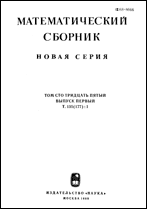|
This article is cited in 20 scientific papers (total in 20 papers)
On uniform convergence of Fourier series
Z. A. Chanturiya
Abstract:
Let $f(x)$ be a continuous $2\pi$-periodic function, $S_n(f, x)$ the $n$th partial sum of its Fourier series, $\omega(\delta,f)$ the modulus of continuity and $v(n,f)$ the modulus of variation of $f(x)$. In this paper the following theorems are proved.
Theorem 1. {\it For $f(x)\in C(0,2\pi)$ the estimate
$$
\|f(x)-S_n(f, x)\|_{C(0,2\pi)}\leqslant C\min_{1\leqslant m\leqslant[\frac{n-1}2]}\Biggl\{\omega\biggl(\frac1n,f\biggr)\sum_{k=1}^m\frac1k+\sum_{k=m+1}^{[\frac{n-1}2]}\frac{v(k,f)}{k^2}\Biggr\},\quad n\geqslant3,
$$
holds, where $C$ is an absolute constant.}
From this theorem there follows an estimate of Lebesgue and an estimate of Oskolkov.
Theorem 2. {\it In order that all Fourier series of class $H^\omega\cap V[v(n)]$ converge uniformly it is necessary and sufficient that
$$
\lim_{n\to\infty}\min_{1\leqslant m\leqslant[\frac{n-1}2]}\Biggl\{\omega\biggl(\frac1n\biggr)\sum_{k=1}^m\frac1k+\sum_{k=m+1}^{[\frac{n-1}2]}\frac{v(k)}{k^2}\Biggr\}=0.
$$
}
Bibliography: 20 titles.
Received: 08.08.1975
Citation:
Z. A. Chanturiya, “On uniform convergence of Fourier series”, Mat. Sb. (N.S.), 100(142):4(8) (1976), 534–554; Math. USSR-Sb., 29:4 (1976), 475–495
Linking options:
https://www.mathnet.ru/eng/sm3016https://doi.org/10.1070/SM1976v029n04ABEH003682 https://www.mathnet.ru/eng/sm/v142/i4/p534
|


| Statistics & downloads: |
| Abstract page: | 677 | | Russian version PDF: | 184 | | English version PDF: | 27 | | References: | 68 |
|




 Contact us:
Contact us: Terms of Use
Terms of Use
 Registration to the website
Registration to the website Logotypes
Logotypes








 Citation in format
Citation in format 
